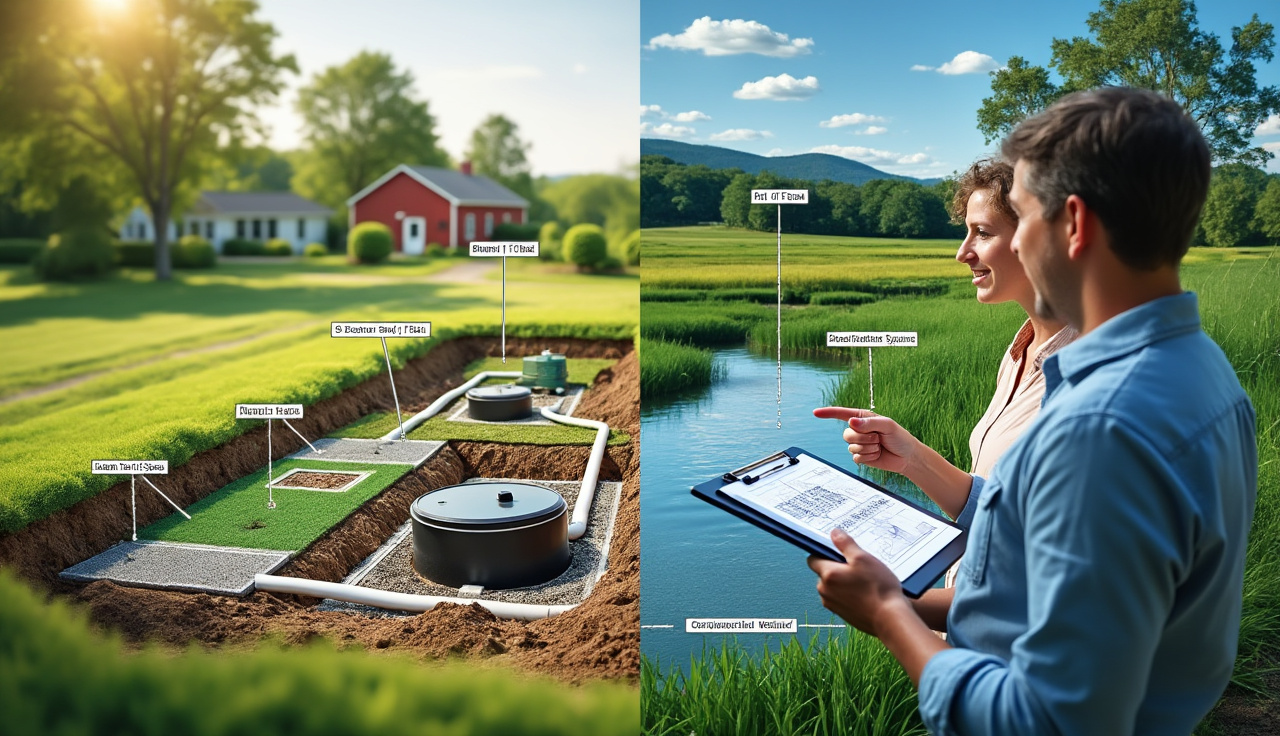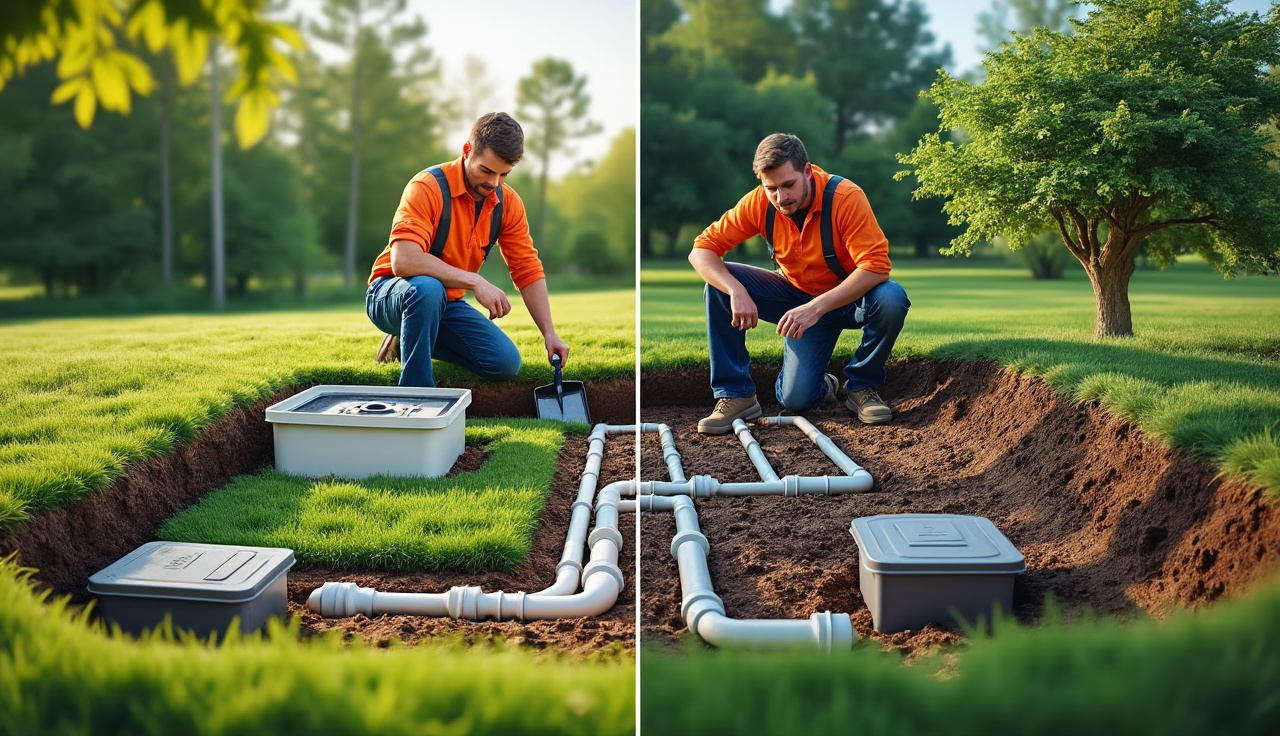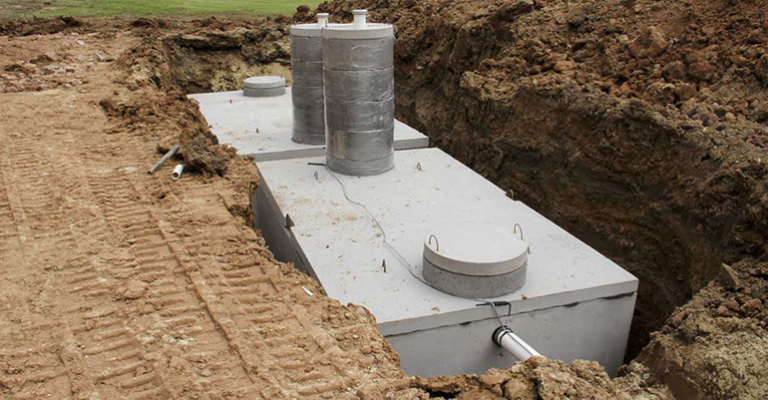Comparing Conventional vs Alternative Septic Systems: Uncovering Powerful Benefits and Drawbacks
When it comes to managing waste, you have options. Conventional vs alternative septic systems both serve the same purpose: treating wastewater. However, they work differently. This guide will help you understand the difference between the two and guide you in making a choice that fits your needs.
Table of Contents
Key takeaways

- Conventional systems use a septic tank and drain field to treat waste.
- Alternative systems include designs like aeration and mound systems, which may be needed in special situations.
- Each system has its pros and cons, depending on your land, soil, and local laws.
- You want to pick a system that works for your home and the environment.
For a thorough understanding of how to maintain your septic system, consider checking out reliable septic system inspection services to ensure everything is functioning correctly.
Understanding Conventional vs Alternative Septic Systems

What is a conventional septic system?
A conventional septic system is the most common type. It has three main parts: a septic tank, a drain field, and soil. Wastewater from your home flows into the tank. Here, solids settle to the bottom, forming sludge, while lighter materials float on top, creating scum. Bacteria break down the solids.
The liquid part moves to the drain field, where it seeps into the soil. The soil filters and cleans the water before it goes back to the ground.
How does it work?
- Wastewater flows into the septic tank.
- Bacteria break down solids.
- Liquid waste moves to the drain field.
- Soil filters the liquid before it goes back into the ground.
Pros and cons of conventional systems
Pros:
- Lower installation costs.
- Simple in design and easy to maintain.
- Suitable for most homes with enough yard space.
Cons:
- Not suitable for areas with high water tables or poor soil.
- Requires regular pumping and maintenance.
- Can fail if not properly maintained.
Comparison of Conventional vs Alternative Septic Systems
| Feature | Conventional Systems | Alternative Systems |
|---|---|---|
| Installation Cost | Lower | Higher |
| Space Requirement | Requires more land | Can be more compact |
| Maintenance Needs | Regular pumping required | Varies by system type |
| Efficiency in Waste Treatment | Moderate | Often higher |
Looking at Alternative Septic Systems
What are alternative septic systems?
Alternative septic systems are different from conventional ones. They are designed to treat wastewater in places where conventional systems might not work well. This can be due to factors like soil type, water table height, or local regulations.
Types of alternative systems
Aerobic treatment systems
This system uses air and bacteria to break down waste. It is more efficient than conventional systems and can fit in smaller spaces. Aerobic systems have a tank that adds air to the wastewater. The added air helps bacteria work faster.
Mound systems
A mound system is built above ground. It is made of sand and soil. This design is used when the soil is too wet to let wastewater drain properly. Mound systems need more space and can be more expensive to install.
Drip distribution systems
This system uses small pipes to spread wastewater slowly over a large area. This helps the soil filter the water better. It is ideal for homes with limited space.
Pros and cons of alternative systems
Pros:
- Can work in areas where conventional systems fail.
- More efficient at treating wastewater.
- May require less space than conventional systems.
Cons:
- Higher installation and maintenance costs.
- Some systems need electricity to run.
- Can be complicated to install and maintain.
Factors to Consider for Your Septic System
- Local Soil Conditions: Understand the type of soil you have, as it affects water drainage and treatment.
- Property Size: Ensure there is enough space for the chosen septic system, including any required drain fields.
- Water Table Level: High water tables may require alternative systems to prevent system failure.
- Local Regulations: Check local building codes and septic regulations before making a decision.
Choosing the Right System for Your Home

Choosing between a conventional and alternative septic system depends on many factors. Here are some key points to consider:
Soil type
Your soil plays a big role in how well a septic system works. If you have sandy soil, a conventional system may be fine. However, clay soil can hold water and cause problems. In such cases, an alternative system might be better.
Space availability
Do you have enough room for a conventional system? Conventional systems need space for both the tank and drain field. If space is limited, look into alternative systems that may fit your property better.
Local regulations
Check with local authorities. Some areas have strict rules about septic systems. You may need a specific type of system based on local laws. Always follow the rules to avoid fines and other issues.
Budget
Costs can vary based on the type of system you choose. Conventional systems are usually cheaper to install. However, alternative systems may save you money in the long run with lower maintenance costs. For expert guidance on septic system repairs, consider exploring trustworthy septic system repair services in your area.
Real-life Experiences in Middletown, NY
In Middletown, New York, local homeowners face unique challenges with septic systems. The region has a mix of soil types and water tables, which means solutions vary widely.
A case for conventional systems
Many homes in Middletown have large yards and good drainage. For these homes, conventional systems work well. Homeowners appreciate their lower costs and simple maintenance. Regular pumping keeps the system running smoothly.
Alternative systems in action
In contrast, some properties have less space, wet soil, or strict local codes. Here, alternative systems come into play. A recent homeowner opted for an aerobic treatment system. This choice saved space and improved wastewater treatment. They found the system easy to maintain and efficient.
Real-life Septic System Choices in Middletown
| Homeowner Type | Preferred System | Reasons for Choice |
|---|---|---|
| Large Yard Owners | Conventional System | Cost-effective, simple maintenance |
| Compact Property Owners | Aerobic Treatment System | Space-saving, efficient wastewater treatment |
| Wet Soil Properties | Mound System | Suitable for poor drainage conditions |
The Future of Septic Systems
As we think about the future, septic systems will keep evolving. New technologies will help treat wastewater better. Homeowners will have more options that fit different needs.
Eco-friendly designs
Many people today care about the environment. New septic systems focus on eco-friendliness. Some alternatives use natural processes to treat waste. These systems help clean water before returning it to the ground.
Smart technology
Technology is also changing septic systems. Some new systems have sensors that alert homeowners when maintenance is needed. This means fewer surprises and better care for your system.
Conclusion
In summary, both conventional vs alternative septic systems can work well for treating wastewater. The best choice depends on your home, land, and local rules. Take time to consider your options. Talk to local experts who can guide you through the process. Whether you choose a Conventional vs Alternative Septic Systems, understanding your needs will help you make the right choice.
By knowing the facts, you can manage your septic system better. Make sure to keep up with maintenance, and your system will serve you well for years to come.
Final thoughts
Choose wisely. Your septic system is an important part of your home. Whether you go with a Conventional vs Alternative Septic Systems design, keep your community in mind. Help protect the environment while keeping your family safe and healthy.
If you’re unsure about your choices, reach out to local experts in Middletown, New York. They can help answer your questions and guide you in the right direction. Understanding the differences between conventional and alternative septic systems will help you make a more informed decision.



